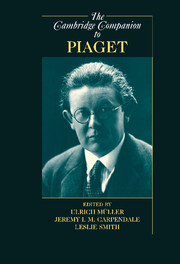Book contents
- Frontmatter
- 1 Introduction: Overview
- 2 The Historical Context Of Piaget’s Ideas
- 3 Piaget’s Developmental Epistemology
- 4 Piaget’s Biology
- 5 On the Concept(s) of the Social in Piaget
- 6 Piaget on Equilibration
- 7 Constructive Processes: Abstraction, Generalization, and Dialectics
- 8 Piaget and Method
- 9 Infancy
- 10 Childhood
- 11 Adolescence
- 12 Piaget’s Theory of Moral Development
- 13 Piaget’s Enduring Contribution to a Science of Consciousness
- 14 Piaget and Affectivity
- 15 Piaget’s Pedagogy
- 16 Piaget in the United States, 1925-1971
- 17 The Mind’s Staircase Revised
- 18 Dynamic Development: A Neo-Piagetian Approach
- Index
7 - Constructive Processes: Abstraction, Generalization, and Dialectics
Published online by Cambridge University Press: 28 March 2010
- Frontmatter
- 1 Introduction: Overview
- 2 The Historical Context Of Piaget’s Ideas
- 3 Piaget’s Developmental Epistemology
- 4 Piaget’s Biology
- 5 On the Concept(s) of the Social in Piaget
- 6 Piaget on Equilibration
- 7 Constructive Processes: Abstraction, Generalization, and Dialectics
- 8 Piaget and Method
- 9 Infancy
- 10 Childhood
- 11 Adolescence
- 12 Piaget’s Theory of Moral Development
- 13 Piaget’s Enduring Contribution to a Science of Consciousness
- 14 Piaget and Affectivity
- 15 Piaget’s Pedagogy
- 16 Piaget in the United States, 1925-1971
- 17 The Mind’s Staircase Revised
- 18 Dynamic Development: A Neo-Piagetian Approach
- Index
Summary
GENETIC EPISTEMOLOGY AND CONSTRUCTIVISM
The key principle of Jean Piaget's genetic epistemology is constructivism. Constructivism rejects old-fashioned rationalism: Knowledge is not made out of special knowledge-parts preformed in each individual knower at birth. It also rejects empiricism: Knowledge does not consist of epistemic pieces impressed on the knower by the environment, whether physical or social. Instead, the knower has to construct knowledge.
Genetic epistemology is a developmental theory of knowledge. It is about what knowledge consists of and how knowledge develops.
Knowledge
What knowledge consists of is not the unique preoccupation of this chapter. However, there is no harm in re-emphasizing certain points, because Piaget's conception is so far removed from those that prevail in contemporary cognitive psychology, artificial intelligence, or philosophy of mind. One can make a reasonable decision (as Boom has, in Chapter 6 of this volume) to characterize his developmental theory in terms of control over experience, where experience is understood in terms, not of information, but of exchanges with an external environment.
But Piaget wanted to keep hold of knowledge rather than yield it to those whose conceptions he thought were inadequate, and we will continue in that vein.
Information
- Type
- Chapter
- Information
- The Cambridge Companion to Piaget , pp. 150 - 170Publisher: Cambridge University PressPrint publication year: 2009
Accessibility standard: Unknown
- 15
- Cited by
